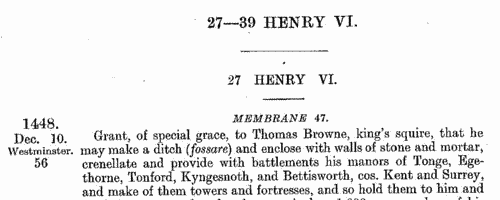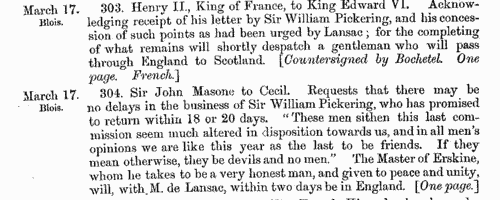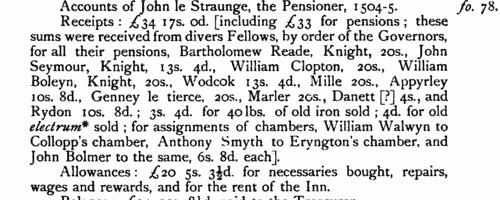Ormond Surname Ancestry ResultsOur indexes 1000-1999 include entries for the spelling 'ormond'. In the period you have requested, we have the following 188 records (displaying 11 to 20): Single Surname Subscription | | | Buying all 188 results of this search individually would cost £1,046.00. But you can have free access to all 188 records for a year, to view, to save and print, for £100. Save £946.00. More... |
These sample scans are from the original record. You will get scans of the full pages or articles where the surname you searched for has been found. Your web browser may prevent the sample windows from opening; in this case please change your browser settings to allow pop-up windows from this site. Recipients of grants of land by the Crown; and other grantors and grantees
(1427-1516)
Grants of land by the Crown were enrolled on the Charter Rolls: but this series of records was also used by other magnates and religious houses as a way of having their own deeds inspected, confirmed and registered. It will be seen from this that some of the material described in these inspeximuses dates back to a considerably earlier period. In addition, there is an appendix of fragments of charter roll material from 1215 and 1286 to 1288. The royal grants enrolled relate not only to land, but also to various privileges that were part of the royal prerogative.
Most of the material is from England, the remainder relating to Ireland, Wales and possessions in France, but virtually nothing from Scotland, which was an independent kingdom at this period.ORMOND. Cost: £4.00.  | Sample scan, click to enlarge

| Ambassadors, ministers, soldiers and spies
(1547-1553)
The State Papers Foreign of king Edward VI consist mainly of letters and reports concerning England's relations with continental Europe, particularly the Netherlands and France. This calendar was edited by William B. Turnbull and published under the direction of the Master of the Rolls in 1861. The main text (to page 290) is abstracts of 710 letters from official correspondents abroad; but the remainder of the volume, entitled Calais Papers, deals with the English enclaves on the French coast.ORMOND. Cost: £4.00.  | Sample scan, click to enlarge

| Lawyers and officers of Lincoln's Inn
(1422-1586)
Lincoln's Inn is one of the ancient inns of court in London exclusively invested with the right to call lawyers to the English bar. The Black Books of Lincoln's Inn are the main administrative records of the society, containing the names of those filling the different offices year by year; the annual accounts of the Pensioner and the Treasurer; regulations; punishments and fines for misdemeanours. This edition, printed for the Inn in 1897, covers the first five surviving volumes.ORMOND. Cost: £6.00.  | Sample scan, click to enlarge

| Hastings family deeds
(1100-1600)
John Harley of the Historical Manuscripts Commission was invited by Reginald Rawdon Hastings to examine his family's extensive archives at the Manor House, Ashby de la Zouche, in Leicestershire. Harley produced a detailed calendar, of which is the first volume, published in 1928, Hastings himself having since died, and Harley having been killed at Gallipoli. This volume covers four categories of the records: the Ancient Deeds; Manorial and other Documents; Accounts and Inventories; and Miscellaneous Papers. Most, but not all, of the material is mediaeval. About half of the deeds relate to the family property in Leicestershire; then there are sections for Derbyshire, Nottinghamshire, Northamptonshire, Lincolnshire, Warwickshire, Staffordshire, Yorkshire, Northumberland, Norfolk, Cambridgeshire, Huntingdonshire, London, Wiltshire, Somersetshire, Devonshire, Buckinghamshire, Oxfordshire, &c. The manorial section includes a partitions of the estates of the Earls of Leicester and Wilton about 1204 and 1277; manor court rolls are mentioned, but not extracted. Choicer items from the family accounts and inventories are copied in extenso for 1596 and 1607, and thereafter summarised. Most of the later material is merely dipped into for curiosities.ORMOND. Cost: £4.00.  | Sample scan, click to enlarge

| Boys at Eton
(1441-1698)
King Henry VI founded a college at Eton in Buckinghamshire in 1440, 'to the praise, glory and honour of the Crucified, the exaltation of the most glorious Virgin His mother, and the establishing of holy Church His bride'. From this foundation has evolved the modern public school. Sir Wasey Sterry compiled a register for the college from 1441 to 1698, from a variety of surviving records, and including groundwork from his 'A List of Eton Commensals' of 1904, and R. A. Austen-Leigh's 'A List of Eton Collegers' of 1905. This resulting 'Eton College Register' was published in 1943. Because of the variety of underlying materials, the entries vary greatly in depth: some names survive only as a surname of not too certain date. In the fullest entries, the surname (often with a variant spelling) is given first, in bold, followed by the years of entry and leaving. The christian name is given next; then birthplace, and name of father. The initials K. S. (King's Scholar) indicate a scholar on the foundation. There will then follow a summary of the man's career, death, burial and probate; and the sources for the information, in italics, at the end of the entry.ORMOND. Cost: £4.00.  | Sample scan, click to enlarge

|  Masters and Apprentices
(1714) Masters and Apprentices
(1714)
Apprenticeship indentures and clerks' articles were subject to a 6d or 12d per pound stamp duty: the registers of the payments usually give the master's trade, address, and occupation, and the apprentice's father's name and address, as well as details of the date and length of the apprenticeship. 1 January to 10 April 1714.ORMOND. Cost: £8.00.  | Sample scan, click to enlarge

|  Masters and Apprentices
(1726) Masters and Apprentices
(1726)
Apprenticeship indentures and clerks' articles were subject to a 6d or 12d per pound stamp duty: the registers of the payments usually give the master's trade, address, and occupation, and the apprentice's father's name and address, as well as details of the date and length of the apprenticeship. 3 January to 31 December 1726ORMOND. Cost: £8.00.  | Sample scan, click to enlarge

|  Masters and Apprentices
(1732) Masters and Apprentices
(1732)
Apprenticeship indentures and clerks' articles were subject to a 6d or 12d per pound stamp duty: the registers of the payments usually give the master's trade, address, and occupation, and the apprentice's father's name and address, as well as details of the date and length of the apprenticeship. 3 January to 30 December 1732ORMOND. Cost: £8.00.  | Sample scan, click to enlarge

|  Apprentices registered in Scotland
(1757) Apprentices registered in Scotland
(1757)
Apprenticeship indentures and clerks' articles were subject to a 6d or 12d per pound stamp duty: the registers of the payments usually give the master's trade, address, and occupation, and the apprentice's name, as well as details of the date and length of the apprenticeship. There are central registers for collections of the stamp duty in London, as well as returns from collectors in the provinces. These collectors generally received duty just from their own county, but sometimes from further afield. The indentures themselves can date from a year or two earlier than this return. (The sample entry shown on this scan is taken from a Liverpool return. Each entry has two scans, the other being the facing page with the details of the indenture, length of service, and payment of duty.) IR 1/52ORMOND. Cost: £8.00.  | Sample scan, click to enlarge

|  Apprentices registered at Bristol
(1758) Apprentices registered at Bristol
(1758)
Apprenticeship indentures and clerks' articles were subject to a 6d or 12d per pound stamp duty: the registers of the payments usually give the master's trade, address, and occupation, and the apprentice's name, as well as details of the date and length of the apprenticeship. There are central registers for collections of the stamp duty in London, as well as returns from collectors in the provinces. These collectors generally received duty just from their own county, but sometimes from further afield. The indentures themselves can date from a year or two earlier than this return. (The sample entry shown on this scan is taken from a Bristol return. Each entry has two scans, the other being the facing page with the details of the indenture, length of service, and payment of duty.) IR 1/53ORMOND. Cost: £8.00.  | Sample scan, click to enlarge

|
Research your ancestry, family history, genealogy and one-name study by direct access to original records and archives indexed by surname.
|













